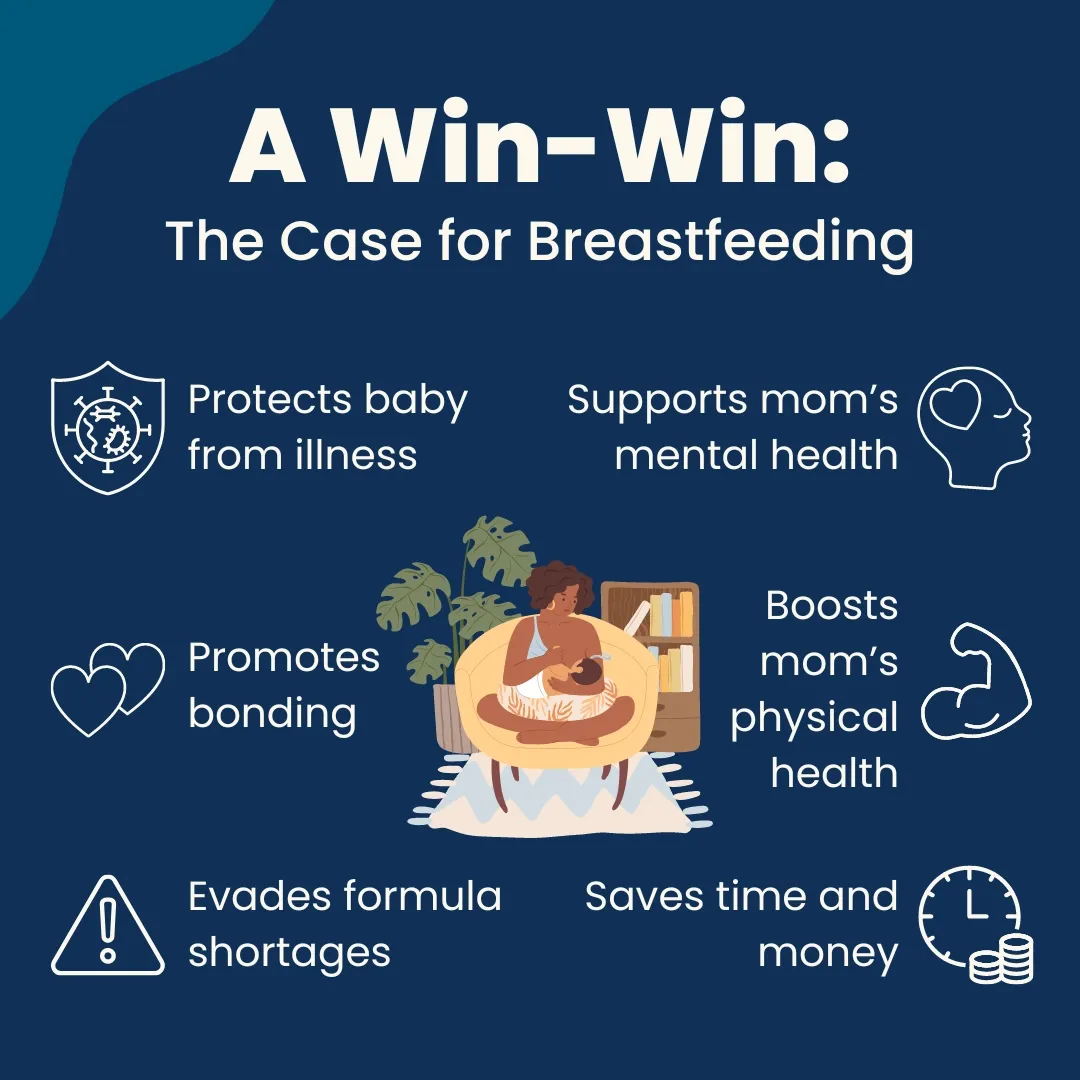
A Win-Win: The Case for Breastfeeding
For many years, the World Health Organization (WHO) has advised mothers to breastfeed their newborns for up to 2 years and beyond. More recently, in June of 2022, the American Academy of Pediatrics (AAP), aligned to that same recommendation. So why is there increasing support and advocacy for breastfeeding? Most simply put, it's a win-win for both the mom and her baby.
Protects baby from illness
In addition to serving as a source of nutrition for babies, breast milk can also protect them from short- and long-term illnesses and diseases. According to the Centers for Disease Control & Prevention (CDC) website, breastfed babies have a lower risk of asthma, obesity, type 1 diabetes, and sudden infant death syndrome (SIDS). They're also less likely to have ear infections and stomach bugs. This is in large part due to the antibodies that pass to the baby through the milk supply. Interestingly, as the baby grows, his mom's supply will actually change to meet his evolving nutritional needs.

Promotes bonding
Breastfeeding promotes skin-to-skin contact along with quiet, quality time for a mom and her baby. Moreover, both experience a boost in oxytocin levels. While the release of this 'feel good' chemical is key to the biological processes involved in nursing, it also plays a big role in bonding. Over time, a breastfed baby will begin to associate his mom with the calm, happy feelings of an oxytocin release. Studies have shown that the same effect on the mother leads to enhanced mothering behavior.
Evades formula shortages
For those who choose formula-feeding, not finding the exact formula they want at their local grocer has always been a potential risk. It wasn't until recently that Americans realized how quickly that risk can escalate from inconvenient to deadly. In 2022, the US experienced a severe shortage of infant formula as a result of a global supply chain crisis compounded by a large-scale product recall. As many as nine children died due to contaminated formula while several more perished when desperate parents attempted to make homemade formulas.
Supports mom's mental health
According to CDC research, about 1 in 8 women with a recent live birth experience symptoms of postpartum depression. The antidepressant and anti-anxiety properties of oxytocin, in addition to promoting bonding, can help mom suffer less symptoms associated with anxiety and depression.
Boosts mom's physical health
Breastfeeding for even a short amount of time can have a myriad of physical health benefits for the mom, too. She'll likely have decreased postpartum bleeding, a quicker recovery, and even lower her risk of breast and ovarian cancers. Prolonged breastfeeding can decrease her risk for type 2 diabetes, rheumatoid arthritis, cardiovascular disease, hypertension, and hyperlipidemia. Bonus: breastfeeding actually burns around 500-700 calories a day which can help mom shed pregnancy weight.
Saves time and money
Between diaper changes, bath times, and laundry, taking care of a baby is intensely time-consuming and expensive. Having the ability to skip filling, heating, and washing a bottle 5x daily is a huge advantage when every quiet moment is precious and fleeting. Better yet, a mom who can produce enough breastmilk and avoid buying formula is able to save thousands in the first year alone. Hard to believe? Check out our cost comparison for a hypothetical breakdown.
Given all of these benefits, it's easy to see why 83% of women in the U.S. at least attempted to breastfeed their babies in 2019 (according to CDC findings). Unfortunately, the rate of women breastfeeding drops dramatically to 56% once the baby is six months old and 36% at age one.
There are many barriers to breastfeeding, one of which is known to be unsupportive work policies and lack of parental leave. Our mission at Boobbatical is to help change that. Check out our Equip and Engage resources to learn how you can join us in battling that barrier.